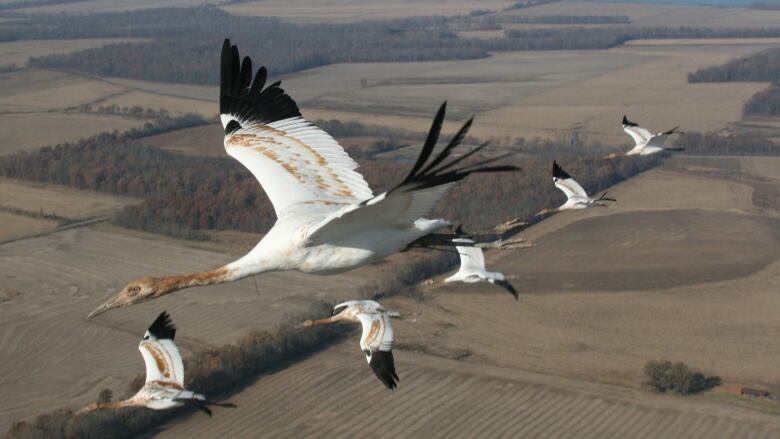U.S. military helps secure land for migrating whooping cranes
With plenty of open space, military bases make ideal habitat for resting whooping cranes

After years at the brink of extinction, whooping cranes are facing a new challenge.
The ponds they use to rest and refuel on their 4,000-kilometremigration from Wood Buffalo National Park, which straddles the N.W.T.-Alberta border,to Arkansas andTexas are disappearing.
But a group that fights for the preservation of whooping crane habitat has come across a military solution of sorts.
"We contacted the military personnel and asked if they could help us out by selecting some of their ponds to be useful to be stopover habitat for whooping cranes," said Chester McConnell, an Alabama-based wildlife biologist with Friends of the Wild Whoopers.
The whooping cranes'journey takes nearly a month,requiringup to 15 rest stops along the way.The birds need small ponds with shallow water that aren't surrounded by too much brush.
But many of those ponds are on private land and aredisappearingdue to development, urbanization and agriculture. Military bases, which often cover huge areas of open space, seemed like an ideal solution.
Ponds on ninedifferent bases are now monitoredand kept shallow. The brush around them ispushed back in hope of attracting the birds.
Amber Dankert, a wildlife team manager atthe Fort Hood base in Texas, which covers nearly 900 square kilometres,saidstaff at the basewere excited to be helping the "whoopers."
"We don't want to see any loss," she said. "There's not enough [cranes] already so we want to increase this population and make this area a safe, healthy stopover."
McConnell said70 ponds may be"whooper friendly," but Friends of the WildWhoopers doesn't know how many of those are being monitored yet.












_(720p).jpg)


 OFFICIAL HD MUSIC VIDEO.jpg)
.jpg)



























































































